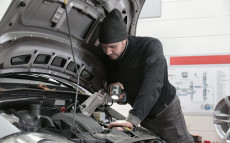- pathfindersAI
- Job Profile
Motorboat Mechanics and Service Technicians
Summary
Motorboat Mechanics and Service Technicians: Navigating a Career on the Water
What They Do
Motorboat Mechanics and Service Technicians are the unsung heroes of the maritime world. These skilled professionals are adept at diagnosing, repairing, and maintaining the engines and mechanical systems of motorboats. This niche yet essential field encompasses a wide range of activities—from routine maintenance to complex engine overhauls, ensuring that both recreational and commercial vessels operate safely and efficiently on the water. Whether they are working on outboard motors, inboard engines, or sophisticated navigational systems, Motorboat Mechanics and Service Technicians play a pivotal role in the boating industry.
Job Responsibilities
The job responsibilities of Motorboat Mechanics and Service Technicians are multi-faceted and require a strong technical acumen. These professionals are tasked with inspecting boat engines and mechanical systems to diagnose issues and implement repairs. They often use specialized diagnostic equipment to pinpoint problems and ensure that engines are running smoothly. Routine maintenance tasks, including oil changes, spark plug replacements, and fuel system servicing, are also critical components of the job. Additionally, these technicians may install or repair boat accessories and systems such as sonar, GPS, and bilge pumps. Their work environment can range from outdoor marinas to indoor repair shops, demanding both versatility and adaptability.
Essential Skills
Motorboat Mechanics and Service Technicians must possess a diverse skill set to excel in their roles. Technical proficiency is paramount, encompassing a deep understanding of engine mechanics, electrical systems, and hydraulic systems. Problem-solving abilities are crucial, as technicians must diagnose issues accurately and implement effective solutions. Manual dexterity and precision are necessary for tasks requiring fine motor skills, such as adjusting engine components and wiring electrical systems. Furthermore, effective communication skills are critical when interacting with clients to explain repairs and maintenance procedures clearly. Time management and organizational skills also play a significant role, given the need to balance multiple tasks and projects efficiently.
Educational Pathways
A career as a Motorboat Mechanic and Service Technician typically begins with a high school diploma or GED, followed by specialized training. Vocational schools, community colleges, and technical institutes offer programs in marine technology, marine mechanics, or small engine repair. These programs usually combine classroom instruction with hands-on training, covering topics such as engine repair, electrical systems, and hydraulic systems. Certification can enhance career prospects, with organizations such as the American Boat and Yacht Council (ABYC) offering specialized credentials. Some professionals may also choose to pursue apprenticeships to gain on-the-job experience under the supervision of seasoned technicians.
Career Prospects
The career prospects for Motorboat Mechanics and Service Technicians are promising, particularly in regions with a thriving boating industry. According to labor market trends, the demand for skilled marine technicians is on the rise, driven by increased boat ownership and the need for regular maintenance and repairs. Opportunities are abundant in marinas, boat dealerships, repair shops, and even through self-employment. Advancement opportunities also exist, with experienced technicians having the potential to move into supervisory roles, open their own repair businesses, or specialize in high-demand areas such as marine electronics.
Conclusion
Embarking on a career as a Motorboat Mechanic and Service Technician offers the opportunity to blend technical prowess with a passion for the maritime world. This profession is vital to ensuring the safety and reliability of motorboats, supporting both leisure and commerce on the waters. With a solid foundation in technical skills, the right educational pathways, and a robust demand for their expertise, these technicians can look forward to rewarding careers. Whether working in bustling marinas or serene seaside repair shops, Motorboat Mechanics and Service Technicians navigate a dynamic and fulfilling career journey, making waves in the maritime industry.
Video
Compensation
| State | Median Salary | Median Hourly | Positions |
|---|---|---|---|
| AL | 44,540 | 21.42 | 530 |
| AK | 60,670 | 29.17 | 110 |
| AZ | 49,890 | 23.98 | 230 |
| AR | 38,090 | 18.31 | 210 |
| CA | 61,190 | 29.42 | 1,380 |
| CO | 48,030 | 23.09 | 90 |
| CT | 58,020 | 27.90 | 350 |
| DE | 47,730 | 22.95 | 160 |
| FL | 50,480 | 24.27 | 4,290 |
| GA | 48,980 | 23.55 | 370 |
| HI | 64,480 | 31.00 | 110 |
| ID | 37,860 | 18.20 | 80 |
| IL | 43,050 | 20.70 | 380 |
| IN | 46,780 | 22.49 | 350 |
| IA | 50,200 | 24.14 | 110 |
| KS | 39,200 | 18.85 | 190 |
| KY | 43,850 | 21.08 | 250 |
| LA | 48,880 | 23.50 | 240 |
| ME | 55,970 | 26.91 | 330 |
| MD | 57,100 | 27.45 | 650 |
| MA | 62,250 | 29.93 | 840 |
| MI | 47,020 | 22.61 | 1,080 |
| MN | 50,620 | 24.34 | 620 |
| MS | 44,100 | 21.20 | 160 |
| MO | 47,010 | 22.60 | 380 |
| MT | 45,070 | 21.67 | 60 |
| NE | 48,100 | 23.13 | 110 |
| NV | 48,280 | 23.21 | 30 |
| NH | 47,860 | 23.01 | 240 |
| NJ | 55,580 | 26.72 | 530 |
| NY | 57,350 | 27.57 | 1,240 |
| NC | 48,080 | 23.11 | 730 |
| ND | 56,730 | 27.28 | 100 |
| OH | 46,140 | 22.19 | 420 |
| OK | 37,440 | 18.00 | 160 |
| OR | 50,720 | 24.38 | 210 |
| PA | 38,870 | 18.69 | 220 |
| RI | 58,680 | 28.21 | 360 |
| SC | 43,870 | 21.09 | 720 |
| SD | 47,250 | 22.71 | 80 |
| TN | 47,930 | 23.04 | 320 |
| TX | 47,620 | 22.90 | 1,560 |
| UT | 58,360 | 28.06 | 90 |
| VT | 57,200 | 27.50 | 80 |
| VA | 53,320 | 25.64 | 830 |
| WA | 61,700 | 29.66 | 830 |
| WI | 46,990 | 22.59 | 750 |
Similar Occupations
In this area you will find other occupations that are close to the one you were viewing in tasks, knowledge and work environment. If the primary job profile you are viewing isn't quite to your liking, take a look around and see what else is available.
Basic and Premium Accounts have more alternative occupations available than the Free account.

Aircraft Mechanics and Service Technicians - 49-3011.00
Aircraft Mechanics and Service Technicians are responsible for diagnosing, repairing, and maintaining the structural, mechanical, and electronic systems of airplanes and helicopters to ensure they operate safely and efficiently. They perform routine inspections, troubleshoot issues, and replace or repair components to meet stringent safety standards and regulatory requirements.
-
$75,020/yr
Median Pay -
137,630
Number of Jobs

Automotive Service Technicians and Mechanics - 49-3023.00
Automotive Service Technicians and Mechanics diagnose, maintain, and repair vehicles by inspecting and working on various components such as engines, brakes, transmissions, and electronics. They ensure automobiles are safe and efficient by conducting routine maintenance, performing complex repairs, and using specialized tools and diagnostic equipment.
-
$47,770/yr
Median Pay -
676,570
Number of Jobs